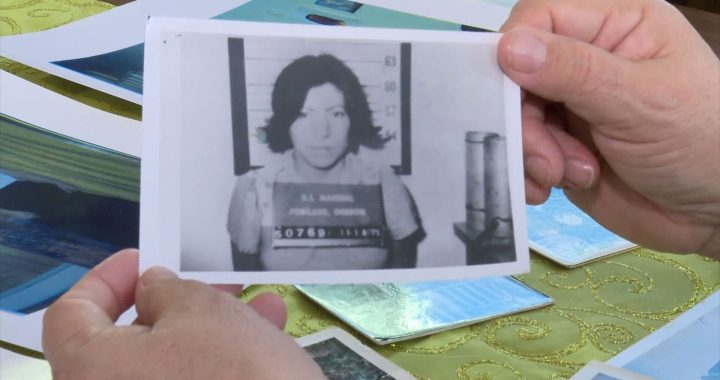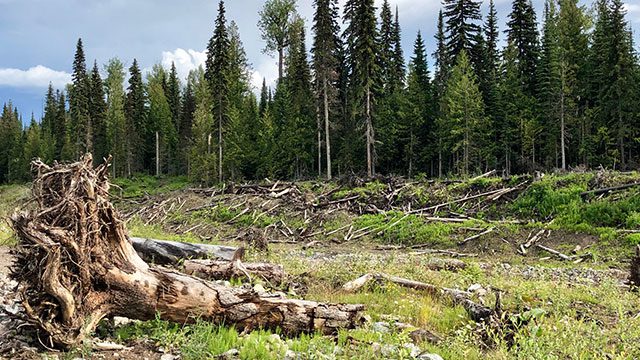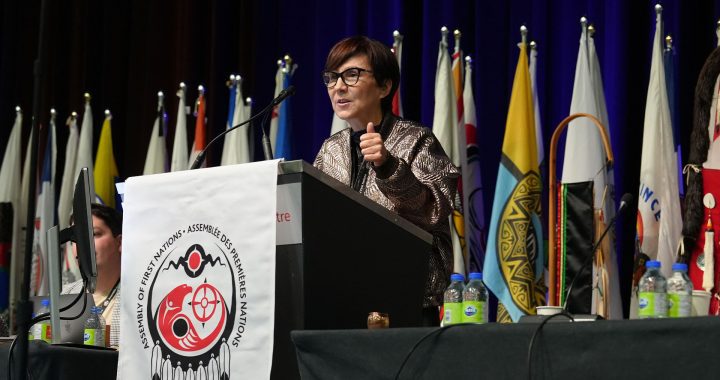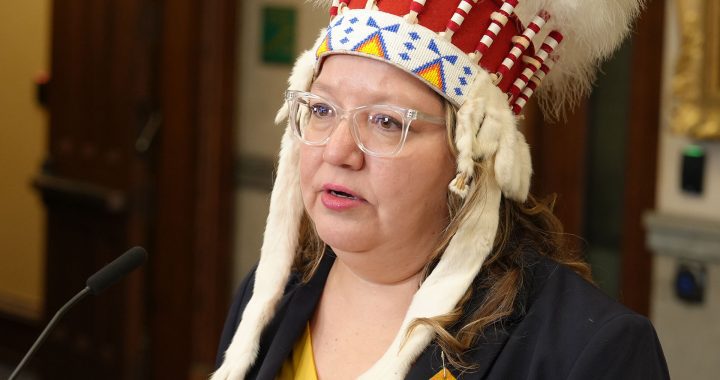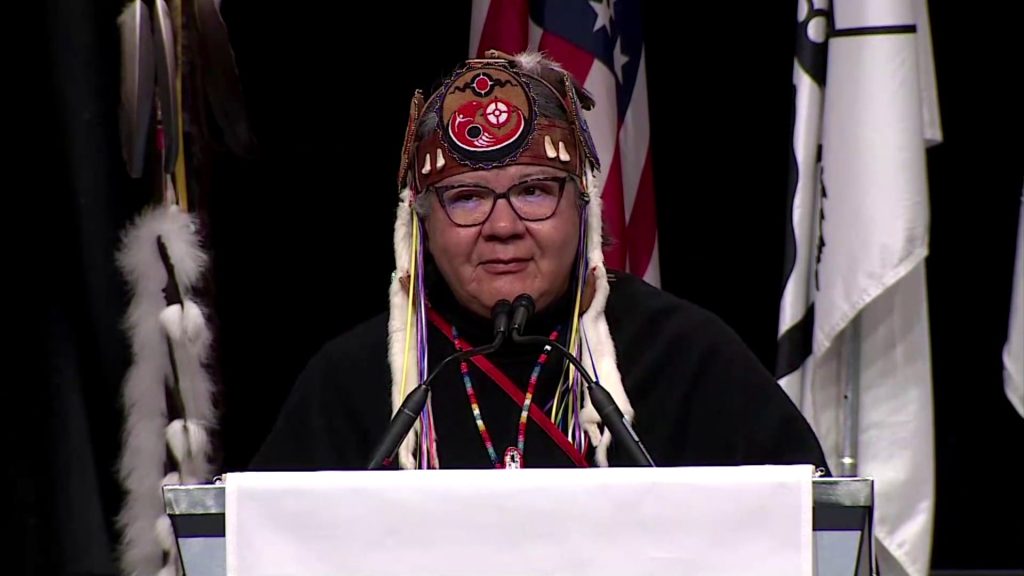
RoseAnne Archibald was national chief of the Assembly of First Nations from June 2021 to July 2023. Photo: APTN News
An investigation into allegations against former Assembly of First Nations national chief RoseAnne Archibald found the ousted leader was guilty of workplace harassment and created a toxic work environment.
The report by Emond Harnden LLP reviewed five complaints against Archibald and found her behaviour amounted to harassment in more than one instance.
A summary of the findings obtained by The Canadian Press says Archibald failed to maintain confidentiality and breached AFN policy, including by retaliating against complainants.
The report was delivered in April to the assembly’s legal counsel.
On June 28, a virtual meeting was held where 163 chiefs and proxies voted to remove Archibald from her position. Sixty-two voted against her remove.
The AFN says it represents 634 First Nations across the country.
The coup was led by several members of the AFN executive made up of regional chiefs across the country.
The report says Archibald breached the AFN’s Workplace Violence, Discrimination, and Harassment Policy, the Whistleblower Policy, and the Code of Conduct and Ethics for the AFN Executive Committee.
All five of the complainants cited in the report alleged that the national chief engaged in workplace harassment and created a toxic or poisoned work environment.
The report says AFN policy and the Canadian Labour Code prevent the disclosure of specific harassment allegations.
It does, however, confirm that two of the five complaints it investigated led to findings that Archibald’s conduct “amounted to harassment.”
And in all five cases, it said, she committed “wrongdoing” as defined by AFN policy.
The report says Archibald violated harassment and whistleblower policy “by making or allowing to be made public statements about the complaints and the complainants between May and August 2022.”
It also says she “retaliated and reprised against the complainants” contrary to AFN policy by making those public statements, causing all five of the complainants’ harm.
“By making statements that question the motives, intentions and integrity of the staff members that have made complaints and by making that suggestion in such a public venue, the Respondent’s conduct amounts to reprisal,” the summary report says.
“As the head of the organization, we would venture that (Archibald) has an added responsibility to respect and comply with its policies.”
The report details accusations that Archibald failed to maintain and direct staff, treated them poorly and threatened or attempted to dissolve, dismantle or disband the staff.
It says one of the complainants told investigators Archibald didn’t want to speak with staff because she didn’t trust anyone and “wondered who may be trying to get rid of her in her new role.”
A complainant cited in the report said Archibald wanted a meeting called to discuss her plans to “bring down” the AFN Secretariat, which provides administrative, technical and support services to members.
And the report also cites a complainant who told investigators they suffered reputational harm because of Archibald’s actions and had to shut down social-media accounts due to death threats.
The investigators were retained by AFN in June 2022 to review four complaints that had been submitted in mid-May, and the scope of the investigation was expanded on June 21 to include a fifth complaint.
Their report came after more than 30 interviews with complainants and witnesses.
According to the report, investigators contacted Archibald several times to meet with her beginning in mid-August 2022 but were only able to do so in November.
That initial meeting was scheduled for five-and-a-half hours and its purpose was “to conduct a formal interview,” the report says, but Archibald’s legal counsel did all the talking. It says she ultimately met with them again to discuss the complaints on Feb. 13.
A copy of last week’s resolution obtained by The Canadian Press shows it was moved and seconded by two women, Chief Irene Kells of Zhiibaahaasing First Nation in Ontario and Chief Kyra Wilson of Long Plains First Nation in Manitoba.
The resolution cited violations of AFN policy found in the report and said the members “have lost confidence in the leadership” of Archibald. It called for Archibald’s immediate removal and for an interim chief to be selected.
RoseAnne Archibald encouraging supporters to reach out to chiefs after being fired
Archibald is calling on supporters to tell their chiefs and councils to reinstate her after she was voted out as national chief of the Assembly of First Nations last week.
In a five minute video posted to Facebook, Archibald also urged supporters to ensure a forensic audit of the national advocacy organization moved ahead.
“You can call or text or email your chief and council and you can ask for two things. One, that they reinstate me as national chief and two, that they make sure that the forensic audit goes ahead,” she said in the video statement recorded in her car in a B.C. parking lot.
https://twitter.com/ChiefRoseAnne/status/1676050422044262401
The AFN consists of a national chief and 11 regional chiefs that make up the executive.
Archibald has consistently denied all the allegations against her.
In Monday’s video, she stated the “pushback” she’s been receiving is because she’s been fighting corruption at the AFN since October 2020.
“I don’t want to be reinstated because of my ego. I want to be reinstated because I have a sacred responsibility that I have to fulfill,” Archibald said in the video.
“What the chiefs did on June 28 is … they just went ahead and did one of the most violent acts against an Indigenous, First Nation woman leader.”
The infighting at the organization played out in public last July at a gathering in Vancouver, when Archibald showed up despite having been temporarily suspended by the AFN executive.
After chiefs voted down an emergency resolution to affirm her suspension, Archibald expressed her gratitude, alleging she was unfairly suspended because she had been trying to investigate corruption within the assembly.
The AFN has said the top post will be vacant until an interim national chief is selected from the executive committee, and that an election is set to take place during a special chiefs’ assembly in December.
Chiefs and proxies are set to meet in Halifax starting July 11.
According to an agenda sent out by the organization on July 3, none of the 45 draft resolutions deal with Archibald’s situation.




